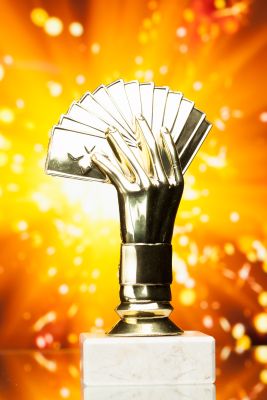
Have you ever been interviewed for a job? Were you one of a group of people seated in a room who was after a good-paying position that would only go to the person who could prove himself or herself most qualified for that post?
If you have been in that position, what I am about to share with you will make sense. It just might help you win a poker tournament.
A couple of days ago, I entered a tournament at Wild Horse Pass Casino near Chandler. The Indian-owned casino hosts several weekly tournaments to get the action going so as to keep their poker tables filled for the cash games.

In the morning tournaments on Monday and Thursday, the poker room will award you extra chips if you have been playing in a cash game before the tournament starts. Naturally all the regulars are aware of this 'free' cash and make sure they were in a cash game.
Once you pay your entry fee, you are assigned to a table and given a seat commission. Usually this happens around 11:45 a.m. which gives you approximately 15 minutes before the dealers begin dealing the tournament.
That is when you should begin sizing up your competition.
There are always new players who enter a tournament, people you have never seen before. In my case, the player in seat two was a big gregarious man in his 50s who possessed a lot of trivia pursuit knowledge about baseball.
He entertained those of us who were seated by sharing knowledge about 'the greatest Cardinal of them all,' who, of course, was Stan Musial. He also told us that Fidel Castro, the retired President of Cuba, had been an aspiring baseball player before he became a revolutionary leader.
Now a player who discusses baseball players before the start of a poker tournament isn't really interested in baseball. He is trying to take his opponents' minds off poker. Sure enough, when the cards started flying around the table, he became all business. The baseball talk was history. He had come to play -- and was knocked out of the tournament within the first 30 minutes.
When he left the table, shoulders slumped in disappointment and anger, I made a remark thanking him for playing. I don't think he heard me.
There was another player at our table, a middle-aged woman who looked like a young grandmother. I knew from her mannerisms that she probably was a middle-of-the-road player who basically played good cards and who was incapable of any tricky plays. I turned out to be right. She didn't last much longer than the baseball expert and went all-in on a pair of queens that failed to stand up to pocket aces.
When you are playing in a poker tournament, observe your competition carefully. Try to figure out who they are by the way they are dressed, by their swagger (do they have a toothpick jutting from the corner of their mouth?) and even by the way they stack their chips. If they stack their chips creatively, watch out. They are capable of slow-playing pocket aces or kings and are fully able to make dangerous trap plays.
And while you are sizing up the competition, take a mind's eye look at yourself. Are you giving away your style of play to an eagle-eyed observer sitting across the table from you? Don't do it. Be mysterious, remain confidence, don't talk too much. Let your play speak for itself. I wonder what would have happened to Cuba and the world if Castro had been offered a contract with the Pittsburgh Pirates or the New York Yankees. I guess we'll never know.
Author: Geno Lawrenzi Jr.
(Geno Lawrenzi Jr. is an international journalist, magazine author and ghostwriter and poker player who lives in Phoenx, AZ. He has published 2,000 articles in 50 magazines and 125 newspapers. If you want to share a gambling story or book idea with him, send an email to glawrenzi@gmail.com ).
Your feedback
Please enter your comment.
Your comment is added.
Comments (1)
OOPaloo
![]() 11/25/15, 07:11:22 PM
11/25/15, 07:11:22 PM
I guess you need experience to read people at a poker table. How does one know for example that one's evaluations are correct? It could be that the ability to equate...
I guess you need experience to read people at a poker table. How does one know for example that one's evaluations are correct? It could be that the ability to equate certain behaviors with poker skill levels in others is more of an art than a science. How do you know if your perceptions or "reads" are giving an accurate picture? How do you know if the players you are observing aren't good actors playing a game to throw your observations off. It seems so complex to me really. Kind of baffling. But what do I know? I don't have that much experience.
Show more



